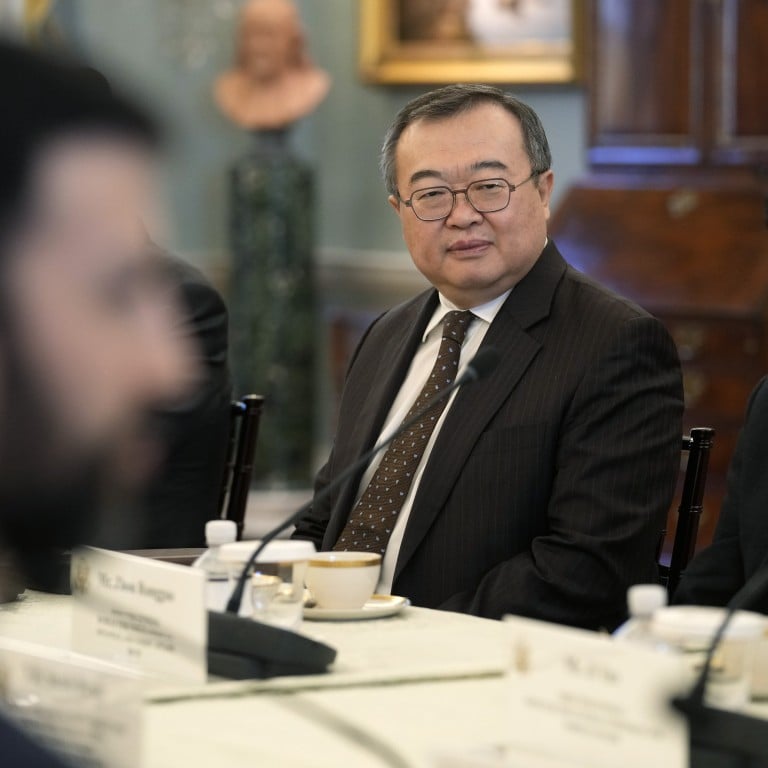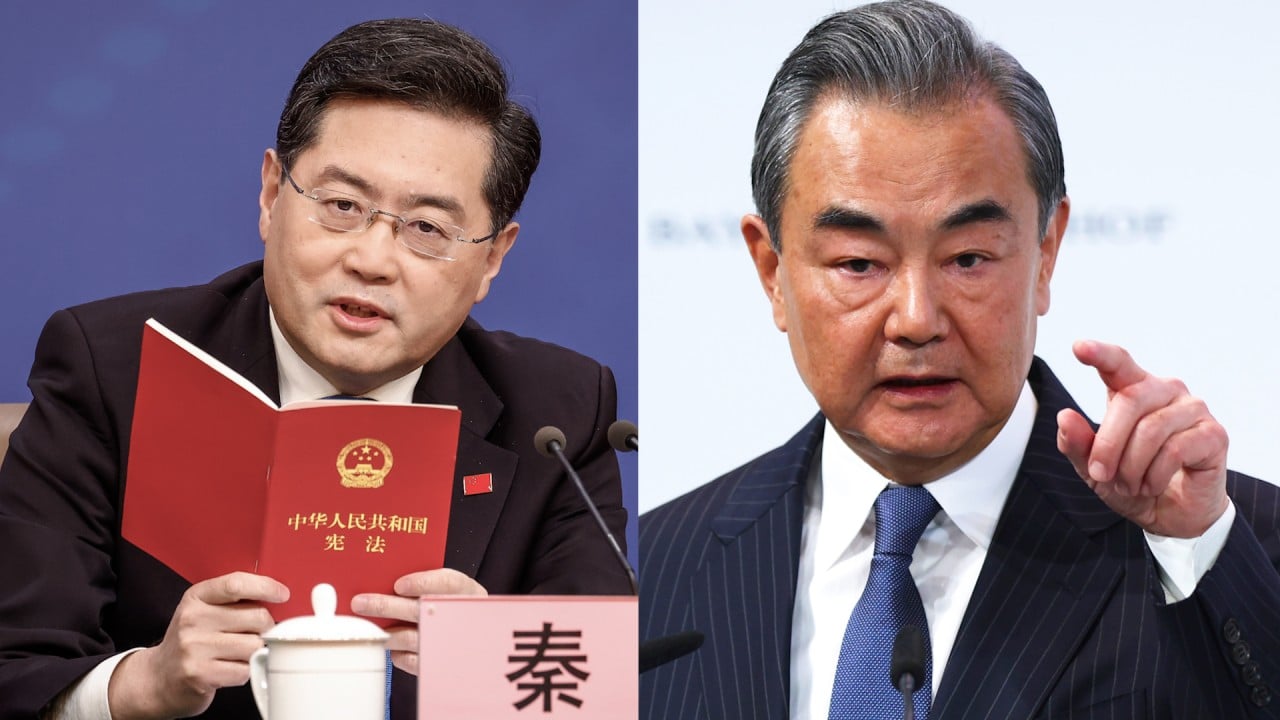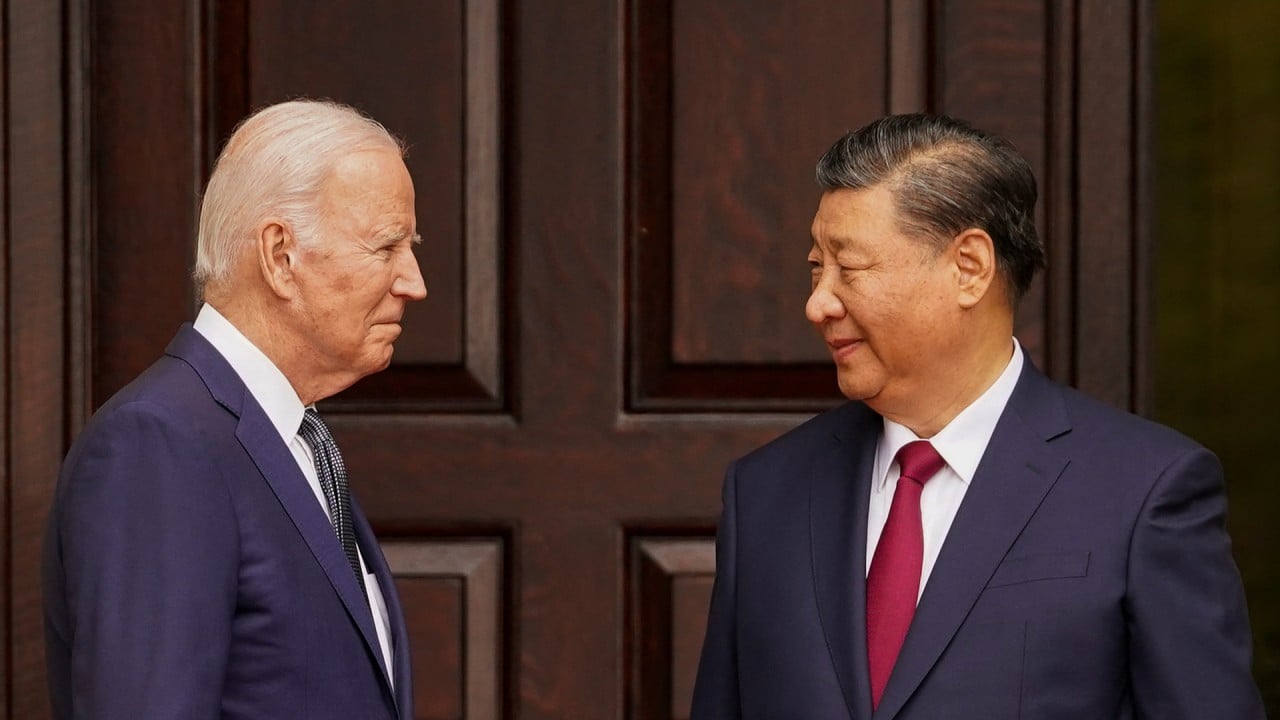
US visit firms speculation Liu Jianchao will be China’s next foreign minister
- 6-day trip by the veteran party diplomat to coincide with the Taiwan election was a ‘smart move’ by Beijing, observers say
- Many believe Liu is in line to replace Wang Yi, who has been doing double duty since last year’s removal of Qin Gang
Liu, who heads the International Liaison Department, the Communist Party’s diplomatic arm, was not the first minister from the department to meet senior officials in the US, but his visit was an unusually high-profile one, and a “smart move” by Beijing, observers said.
Liu’s six-day mission to Washington, New York and San Francisco not only helped to tamp down spiralling tensions over Taiwan, it also boosted the international exposure of the man widely seen as a leading contender to become China’s next foreign minister.
Liu, 59, held talks with Secretary of State Antony Blinken and other senior officials, and met a range of non-government figures, including academics, business leaders, media representatives and former officials.
Liu also met United Nations Secretary General Antonio Guterres and attended an unofficial bilateral dialogue with US think tank the Asia Society, as part of a “Track 1.5” diplomacy effort to bring together government and non-government figures.
Communist Party diplomat, on US visit, urges ‘correct’ understanding of China
The visit made Liu – an aide to President Xi Jinping – the most senior Chinese official to visit the US since Xi’s summit with his counterpart Joe Biden in San Francisco two months ago.
According to Neil Thomas, a Chinese politics fellow at the Asia Society Policy Institute’s Centre for China Analysis, Liu’s US trip attracted “an unprecedented level of attention”.
Sourabh Gupta, a senior policy specialist with the Institute for China-America Studies in Washington, said the decision to schedule Liu’s visit in conjunction with the outcome of the Taiwanese elections was “a smart one”.
“It reinforced the perception of open channels of high-level communication, which is stabilising for the bilateral relationship, as well as a sense of restraint on Beijing’s part in response to the [Taiwan] election outcome,” Gupta said.
“After all, if it had an incendiary response up its sleeve, Beijing would not have scheduled a senior diplomatic meeting with Washington so close to the election.”
Yun Sun, co-director of the East Asia programme and director of the China programme at the Washington-based Stimson Centre, met Liu during his visit to the US capital and was impressed.
“The rumour is Liu will be appointed foreign minister in the coming months. [He is] very articulate, eloquent, [speaks] great English and [has] a nice aura of confidence/ease. He knows the issues like the back of his hand,” she said.
Communist Party diplomat Liu Jianchao steps up role in China’s foreign policy drive
Liu is an unusually active liaison department head – a role traditionally responsible for inter-party diplomacy, mostly with other socialist countries, such as North Korea and Vietnam.
His busy travel schedule across Asia, Europe and Africa since his appointment in June 2022 raised many eyebrows, as has his prominent role in helping to repair China’s image abroad in its post-pandemic diplomatic drive.
Observers generally agree that Liu has played an outsize role in the country’s diplomacy, fuelling speculation that he is set to replace Wang Yi – reappointed as foreign minister in July after the mysterious removal of Qin Gang.
Wang, 70, vacated the role in late December 2022 after he was promoted to the Politburo, in the same reshuffle that elevated Qin to foreign minister. Beijing has yet to explain Qin’s removal, but many observers believed that Wang’s return would be temporary.
While Liu had “candid” and “constructive” discussions with US officials on a range of thorny bilateral issues and regional and global security challenges, cross-strait tensions appeared to be high on the agenda of his US visit.
In his talks with Blinken on the eve of Taiwan’s high-stakes election, Liu elaborated Beijing’s stance and emphasised “the need for both sides to meet each other halfway”, according to the official Chinese readout.
“Liu’s shrewd diplomacy seemed designed both to reassure Washington that Beijing would not respond aggressively to the Taiwanese elections and to maintain the Communist Party’s bottom line on its sovereignty claims over Taiwan,” Thomas said.
“Liu is a front runner to become China’s next foreign minister, and the apparent success of his visit to the US could help him clinch the position.”
Taiwan election: Beijing restrained in response to William Lai’s win
According to Sun, Liu’s trip was clearly a concerted effort by Beijing and Washington “to convey the message that the US and China are in close communication on the issue of Taiwan to avoid misunderstandings or any mishaps”.
Observers also noted that Liu was in the US when Beijing delivered its relatively muted response to the election results, despite its unease at the prospect of a third consecutive term in the presidency for the independence-leaning Democratic Progressive Party.
The usually soft-spoken Liu was also willing to be blunt during his visit on the subject of Taiwan, which Beijing regards as a province to be brought under mainland control, by force if necessary.
In a speech to the Council on Foreign Relations, Liu said the Taiwan question is at the “very core of the core interests” and “the red line that mustn’t be crossed”.
He added that Beijing took seriously US statements that it did not support Taiwan’s independence. “And we hope that the US side will honour this commitment,” Liu said.
The US, like most countries, does not recognise Taiwan as an independent state but is opposed to any unilateral change to the status quo.
Liu’s comments were a contrast to the moderate tone he took throughout the US trip – which his department said was partly aimed at dispelling “Western media’s bias against China” – and the rest of his speech to the think tank event.
In fluent English, Liu sought to reassure American businesses and present China’s increasingly assertive foreign policy in a benevolent light. “China will not fight a cold war or a hot war with anyone,” he pledged.
US-China relations: veteran Chinese diplomat vows to help build sustainable ties
“Overtaking the United States is not our goal,” Liu said. He added that Beijing had no plan to “change the current international order” led by Washington, or create a new one.
“My visit this time is to have candid exchanges with people from across American society on how to implement the San Francisco vision [from the Xi-Biden summit],” he said.
Beijing and Washington resumed high-level exchanges after the summit, including top-level military communications which restarted last month.
Xi and Biden exchanged congratulatory messages on January 1 to mark the 45th anniversary of official diplomatic relations between the two countries. And, in addition to Liu’s visit, Commerce Minister Wang Wentao spoke by phone this month with his US counterpart Gina Raimondo.
According to Philippe Le Corre, a non-resident senior fellow at the Asia Society Policy Institute’s Centre for China Analysis, many China experts believe Liu’s coming appointment as foreign minister is “the reason he was allowed to go on this US tour”.
For Gupta, the increased prominence of Liu’s department could be “a double-edged sword”.
“It partially relieves Wang Yi of putting in double duty, but on the global stage China is better represented by its government than [the] party, given the latter’s reputation for opacity,” he said.
“And in the West particularly, where the Communist Party of China is not held in the highest esteem, senior party institutional heads conducting high-profile diplomacy is not necessarily the best look,” he added.
“The International Liaison Department’s outreach is best kept to fellow socialist states with Leninist systems and with parties in ‘friendly’ democracies.”



